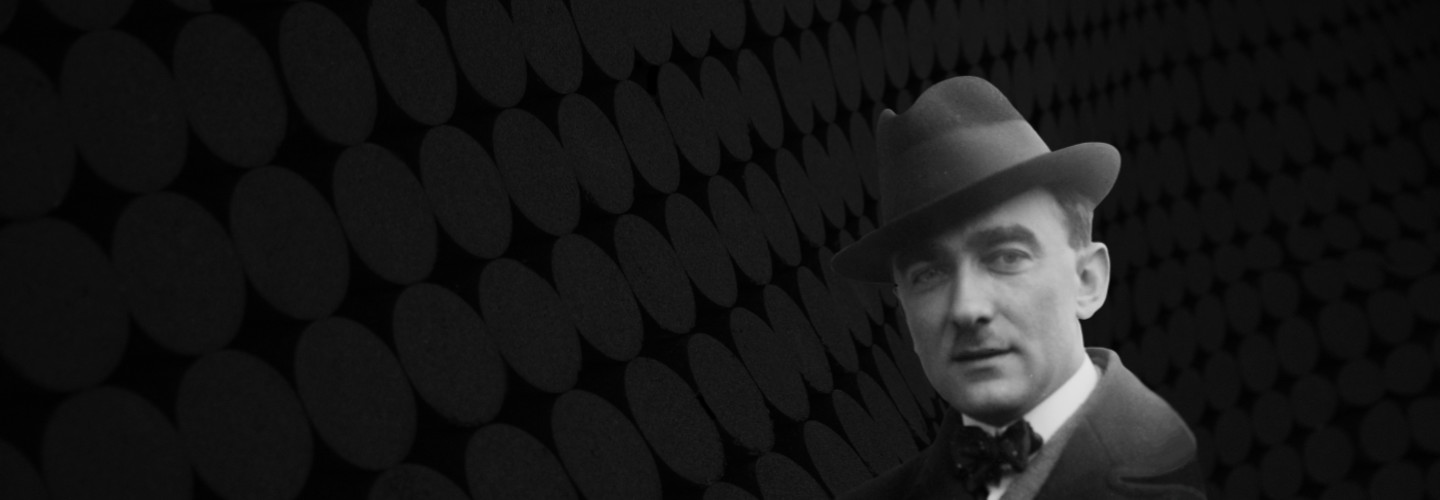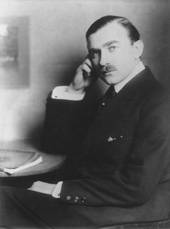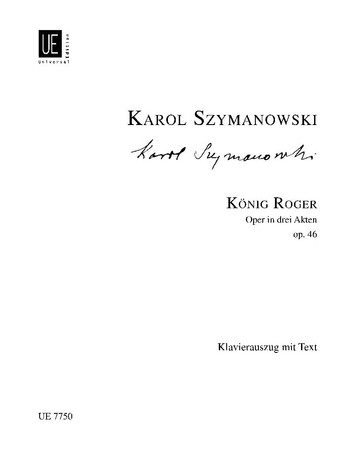

Karol Szymanowski
König Roger
Short instrumentation: 3 3 4 3 - 4 3 3 1 - perc(6), hp(2), cel, pno, org, str
Duration: 120'
Übersetzer: Piotr Kaminski, Josef Frantisek Munclinger, Geoffrey Dunn, Rudolf Stephan Hoffmann
Libretto von: Jaroslaw Iwaszkiewicz, Karol Szymanowski
Dedication: à Dorothy Jordan Robinson
Choir: SATB<BR>boys' choir: discant (soprano)/alto
Instrumentation details:
1st flute
2nd flute
3rd flute (+picc)
1st oboe
2nd oboe
cor anglais (+3rd ob)
1st clarinet in Bb (+cl(A))
2nd clarinet in Bb
3rd clarinet in Bb (+cl(A)
cl(Eb))
bass clarinet in Bb
1st bassoon
2nd bassoon
contrabassoon (+3rd bsn)
1st horn in F
2nd horn in F
3rd horn in F
4th horn in F
1st trumpet in Bb (+tpt(C))
2nd trumpet in Bb (+tpt(C))
3rd trumpet in Bb (+tpt(C))
1st trombone
2nd trombone
3rd trombone
tuba
percussion(6): xylophone, glockenspiel, timpani, triangle, cymbals, tam-tam, snare drum, long drum, bass drum
1st harp
2nd harp
celesta
piano
organ
violin I
violin II
viola
violoncello
contrabass
stage music: 1st trumpet in C
2nd trumpet in C
3rd trumpet in C
4th trumpet in C (ad lib)
tam-tam
Szymanowski - König Roger
Audio preview
Video
Work introduction
The European music of the turn of the century is marked by the rush sound. In the succession of Richard Wagner, the orchestra pedal becomes the medium of excessive sound staging. The word "sound" itself takes on a magical meaning.
The Polish composer Karol Szymanowski, who was born in 1882, the year Wagner died, must also be counted among the sound erotomens. If we ignore the Polish creative period of Szymanowski, many of his works are absolute sound maniatures. His opera King Roger is no exception.
On his travels to Italy and North Africa between 1908 and 1914, Szymanowski succumbed to the fascination of these countries and collected a great deal of material, which was reflected in King Roger. According to its genre, opera stands in the mysterious "no man's land" between opera, oratorio and mystery play. In the three acts of the opera, Szymanowski captured three different cultures - partly based on authentic musical material: Byzantism, the Arab-Indian Orient, and Greco-Roman antiquity.
The plot itself is rooted in Euripides' "Bacchantes" and depicts in three oratorio-like tableaux: the struggle between Apollo and Dionysus, between the intellect and the unconscious, and between the Christian church in medieval Sicily and the pagan faith.
The libretto that Szymanowski wrote together with Jarosław Iwaszkiewicz can only be traced back to historical facts regarding the persons of King Roger II, who ruled over Sicily from 1130 to 1154, and his advisor. Although the plot refers to typical counter-events of the time, it is fictitious as such.
What is decisive for this opera is that Szymanowski proves to be an absolute master of ecstasy, mysticism and misterioso.


